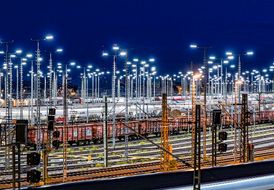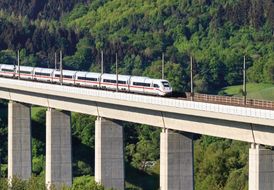Climate protection
Management approach and climate protection target
We are seeking to create incentives to shift traffic towards rail. Achieving a shift in the mode of transport is key to meeting Germany’s climate protection targets in the transport sector. Even as the transport sector moves towards electrification, the low levels of friction generated by wheel-rail contact mean that rail travel will continue to be the most efficient form of energy use.
In 2020, the Science-Based Targets Initiative (SBTi) provided us with scientific confirmation that: our targets for reducing greenhouse gas emissions contribute to achieving the goals of the Paris Climate Agreement.
In 2021, we made our climate protection target even more ambitious, and want to become climate-neutral by 2040. This means that we intend to achieve our climate protection target ten years earlier than previously planned. Our target year is therefore five years ahead of the Federal Government’s target year for the climate neutrality of Germany. In line with our strategic focus, the greenhouse gas emissions from DB Arriva’s business operations are no longer factored into DB Group’s climate protection target. Nevertheless, DB Arriva has also set itself the target of becoming climate-neutral by 2040.
Climate-neutral DB
In order to achieve our climate protection target, we are uniting the related activities across the Group under the umbrella of “Climateneutral DB.” The project is developing greenhouse gas reduction pathways (phase-out plans), improving the transparency of planned measures and optimizing the solutions to the overarching challenges of greenhouse gas reduction. In addition to emissions from rail and road transport operations, emissions from buildings and stationary facilities are also considered. New, climate-friendly technologies are being tested and piloted across all business units. The implementation of our starter packages for diesel phase-out and heat transition are also managed by the project team.
In order to achieve our climate protection target, we have laid out a number of ambitious milestones: by 2030, we will have more than halved specific greenhouse gas emissions (i.e. emissions in relation to performance figures such as volume sold) worldwide compared to 2006. Within Germany, the implementation of the Strong Rail strategy and transport policy measures could help to achieve a noticeable shift in the mode of transport by 2030. This and other measures in rail transport could also save up to 10.5 million tons CO₂ in the transport sector in Germany per year.
We plan to increase the share of renewable energies in the DB traction current mix in Germany to 80% by 2030. By 2038 at the latest, we intend to have fully converted DB train operating companies in Germany to eco-power. In our buildings and stationary facilities, we have also started to switch the power supply to renewable energy sources. From 2025, all of our depots, office buildings and stationsno. 147 in Germany will be fully eco-powered.



